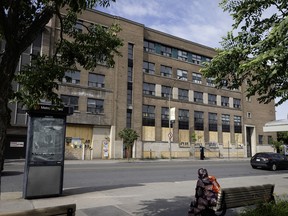City of Montreal paid $6.5 million for the five-storey building at the corner of Hutchison St. and Ogilvy Ave. in Parc-Extension.

The Plaza Hutchison building, a symbol of the gentrification battle in Parc-Extension for many housing advocates, is sitting vacant and in disrepair four years after the city of Montreal acquired it using new legal powers to develop social housing.
But four years later, the units haven’t materialized, and the Villeray—St-Michel—Parc-Extension borough confirmed in response to a recent access-to-information request filed by the opposition Ensemble Montréal party that no project is on the horizon. Moreover, fire department inspectors have twice warned of danger from falling bricks since the city became the building’s owner.
“The city spends a lot of money to acquire land with the right of pre-emption, to acquire different sites, and subsequently, it allows them to deteriorate for years and years,” city councillor Julien Hénault-Ratelle, Ensemble Montréal’s housing critic, said in an interview this week.
“Like with other properties where the pre-emptive right was used, unfortunately after all these years we don’t see the shadow of a single social or affordable housing project.”
This past March, a fire department inspector noted the building’s rear wall “presents structural problems … the brick crumbles to the ground.”
In April 2022, the fire department erected yellow tape around the back of the building after an inspector found the masonry “in poor condition on the top of the rear wall. Some bricks have already fallen and others present an imminent danger of falling.”
Ensemble Montréal obtained the inspection notes through access-to-information.
The city needs to take better care of its buildings, Hénault-Ratelle said, noting that it has an envelope this year of just $789,000 to repair municipal-owned vacant buildings.
“The city does a bad job of maintaining its own buildings,” Hénault-Ratelle said, “while giving lessons to private owners and saying they’re bad owners.”
The Plante administration declined an interview request. Simon Charron, a spokesperson for the mayor and city executive committee, instead referred questions to the city’s corporate communications office. The office didn’t respond by the newspaper’s publication deadline Wednesday.
Ensemble Montréal is also critical of the Plante administration for continuing to acquire real estate at speculator prices using the right of first refusal without ensuring that housing projects come to fruition. The city has earmarked $555 million in its capital works program to purchase more properties for social and affordable housing projects over the next 10 years.
The Villeray—St-Michel—Parc-Extension borough recently announced a mural will be painted on Plaza Hutchison’s facade in August, which Hénault-Ratelle contends is an admission that no housing project is expected in the short term.
“That’s what we find deplorable — the lack of concrete action and leadership by the Plante administration and Projet Montréal to serve Montrealers who need it,” Hénault-Ratelle said.
However, a community organizer in Parc-Extension says the city is making the right move by purchasing strategic buildings like Plaza Hutchison as their owners put them up for sale because it removes them from the speculative market.
Darwish said Premier François Legault’s Coalition Avenir Québec government deserves most of the blame for the lack of social housing construction.
The CAQ government replaced the provincial AccèsLogis program, which financed social housing construction, with what Darwish calls the less efficient and less transparent Programme d’habitation abordable Québec (PHAQ). Program financing no longer fully covers construction costs, she said. And social housing groups now have to compete with developers and universities for funds, she said.
“It’s in large part because of this that social housing projects have stalled, not only in Parc-Extension but across all of Montreal and across all of Quebec,” Darwish said.
“I fully believe that they (the province) hold primary responsibility for sites like the Plaza Hutchison going undeveloped.”
However, the neighbourhood isn’t going to allow Plaza Hutchison to remain vacant for much longer, she added.
“We won’t leave any stone unturned,” she said.
“And obviously, Plaza Hutchison is going to be one of the sites that will most likely become a priority given that the building has become a symbol of the struggle against gentrification in Parc-Ex.“